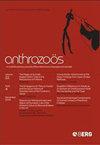外行人对狗和猫行为的拟人化解释和行为学描述
IF 2.3
2区 农林科学
Q2 SOCIOLOGY
引用次数: 44
摘要
像动物学家和兽医一样,外行人通常会用他们自己的非结构化观察来解释他们的伴侣动物的行为,通常是拟人化的。最近,拟人论在科学家中引起了新的兴趣,因为一些关于“动物心灵”的具有挑衅性的出版物,促使了认知行为学领域的研究,以及对动物情感的许多猜测。本研究报告的目的是考虑到观察者与伴侣动物物种的经验,确定拟人化解释和狗和猫的行为和面部表情的行为学描述的并发性和合理性。独立的宠物主人和非宠物主人组(n=128)展示了选定的静止照片和编辑的视频序列,首先是自发的,然后是多项选择模式。这些程序是在交互式CD-Rom上编写的。嵌套方差分析表明,选择不同的…本文章由计算机程序翻译,如有差异,请以英文原文为准。
Anthropomorphic interpretations and ethological descriptions of dog and cat behavior by lay people
ABSTRACTUnlike ethologists and veterinarians, lay people supposedly use their own unstructured observations to interpret their companion animals' behavior, often in anthropomorphic terms. Recently, anthropomorphism has evoked new interest amongst scientists as a result of provocative publications concerning “animal mind,” that have prompted investigations in the field of cognitive ethology, and much speculation about the emotions of animals. The purpose of the research reported here was to determine the concurrency and plausibility of anthropomorphic interpretations and ethological descriptions of dog and cat behavior and facial expressions, taking into account the observer's experience with the companion animal species. Independent sets of pet owners and non-owners (n=128) were presented with selected still photographs and edited video sequences to interpret, first spontaneously, then in a multiple choice mode. These were programmed on an interactive CD-Rom. Nested ANOVA showed that the choice of differe...
求助全文
通过发布文献求助,成功后即可免费获取论文全文。
去求助
来源期刊

Anthrozoos
农林科学-兽医学
CiteScore
3.40
自引率
18.80%
发文量
43
审稿时长
>36 weeks
期刊介绍:
A vital forum for academic dialogue on human-animal relations, Anthrozoös is a quarterly, peer-reviewed journal that has enjoyed a distinguished history as a pioneer in the field since its launch in 1987. The key premise of Anthrozoös is to address the characteristics and consequences of interactions and relationships between people and non-human animals across areas as varied as anthropology, ethology, medicine, psychology, veterinary medicine and zoology. Articles therefore cover the full range of human–animal relations, from their treatment in the arts and humanities, through to behavioral, biological, social and health sciences.
 求助内容:
求助内容: 应助结果提醒方式:
应助结果提醒方式:


